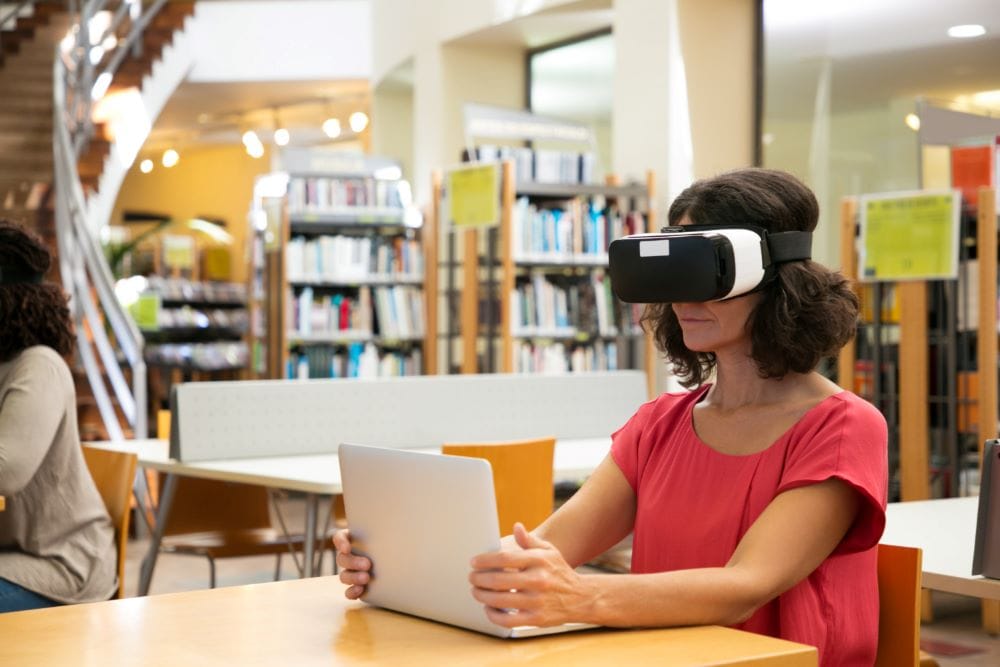Theme: The theme is about technology’s role in education and its future trends.
What: This article discusses how the integration of technology helps to improve education.
Why: To encourage educators, administrators, and policymakers to integrate technology into classrooms.
The evolution of technology has changed our lives in every way. It plays a vital role in every sector, including education. Advanced technology empowers learners for the future. This helps to bring new opportunities for both learners and educators.
In this blog, we will explore the role of technology in the education system along with its future trends.

Introduction
The phrase “Technology in Education” includes two terms: “Technology” and “Education”. “Technology refers to the use of scientific knowledge for practical purposes. Education Systems are the framework or structure that facilitates learning and teaching assessment in schools, colleges, and other educational institutions.
Thus, technology in the education system is the process of analyzing, designing, developing, and implementing learning environments and learning materials.
Importance of Technology in the Education System
Technology is the most important factor in the education sector. Nowadays, both educators and learners are increasingly using technology. Students can access online resources and perform research by using different E-learning technological tools. This helps both learners and educators by making the education system more accessible, engaging, independent, interactive, and effective.
Roles of Technology in the Education System
The roles of technology in the education system are given below:
- Improve Learning Experiences
Technology facilitates an improved learning experience by encouraging students to interact with teachers through various digital platforms. It improves the engagement between both learners and educators by using a visual information system.
It enables students to access up-to-date information more quickly and easily. Students can learn better through technology-based E-learning. They can easily find resources and don’t have to depend on teachers.
- Collaboration and Communication
Technology has improved communication and collaboration among teachers, students, and parents. Students can collaborate from different locations on projects and share ideas. Teachers can collaborate more efficiently on lesson planning, sharing resources, and providing feedback.
- Promotes Effective Education System
The introduction of technology into the classroom has a positive impact on the enhancement of students knowledge and skills. It promotes an effective education system by improving learning and fostering collaboration through virtual classrooms and global connectivity. It is a powerful tool to promote an effective education system worldwide.
- Personalized Learning
The importance of technology in education is not just limited to efficient learning. However, students can also have personalized learning opportunities. One of the greatest benefits of technology is the ability to access resources 24/7.
- Increase Resources for Teachers/Students
Technology provides teachers with various e-learning tools, such as Gamification, AR/VR, and smart boards. Teachers can utilize many digital tools to enhance learning opportunities for students.
Students can use online libraries, courses, tutorials, and repositories to learn on their own.
- Time & Cost Efficiency
E-learning technology provides access to affordable online study material, reducing the need for expensive textbooks and course materials. Online study materials are cheaper than traditional materials.
Teachers can save money and time by using advanced educational technology systems such as augmented reality and virtual reality training programs. This helps students learn faster and better.
The Future of Technology in the Education System
We have already discussed the role of technology in the education system. Now, we are going to discuss the upcoming technologies in the education system.
- Virtual Reality (VR)
- Augmented Reality (AR)
- Blockchain Technology
- Cloud Computing
- Adaptive learning systems
- Artificial Intelligence (AI)
The future of technology in the education system is bright and full of possibilities. Educators can create learning experiences that are more engaging, personalized, and inclusive through technology integration in education. This advancement aligns with the growing demand for individuals with the most employable degrees, as technology-enhanced education equips students with the skills and knowledge needed for success in various fields.
Conclusion
Integrating technology into the education system shows how technology will continue to influence and improve the education sector. This integration allows for increased communication and collaboration, maximized resources, personalized learning opportunities, improved learning experiences, time & cost-efficiency, and the promotion of an effective education system.
Also, the future of technology such as Augmented Reality, Virtual Reality, and Artificial Intelligence creates many opportunities for educators and learners. We can provide the next generation with the skills needed for an innovative future by investing in teacher training, ensuring fair access, and promoting responsible use of technology.
FAQs
1. How Can We Improve Our Education System?
We can improve our education system by:
- Identifying Flaws & Setting Objectives to Achieve
- Promoting Project-Based Learning
- Using Modern Technology
- Remodeling Assessments
- Upgrading Teaching Methods
2. What Types of Technologies are Used in the Education System?
There are two types of technologies used in the education system:
- Synchronous media
- Asynchronous media
3. What are the Limitations of Technology in the Education Systems?
The limitations of technology in the education system are:
- Misuse of Technology
- Technical Failure
- Threats to the Ethics of Education
- Attention Deficit Syndrome
- Accessibility Issues
- Lack of Teacher Training, etc.
4. Can Modern Technology Replace Teachers?
Technology cannot replace teachers because they provide essential human connections, emotional support, and personalized guidance, which technology can’t provide.
5. What is an Online Education System?
An online education system is a platform where students engage in teaching and learning activities through the Internet. It creates virtual classrooms and provides digital resources to encourage teaching and learning remotely.











